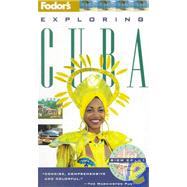
| My Cuba, by Fred Mawer Cuba Is: Discusses aspects of life and living today, from communism to rum | |
| Caribbean communism Fidel Castro | |
| Its People Landscape and Wildlife Socialism or Death | |
| A Beleaguered Economy Capitalist Reforms | |
| Daily Life Social Welfare Living with Tourism Exodus and Exile Music Sport | |
| Food and Drink Rum Cuba Was: Places the country in its historical | |
| context and explores past events whose influences are still felt | |
| Discovery and Colonization Sugar and Slaves Independence Wars José Martí U.S | |
| Interference A Pseudo Republic | |
| The Road to Revolution | |
| A Socialist Transformation Che Guevara Pigs and Missiles A to Z: Covers places to visit, arranged by region, with suggested walks and drives | |
| Within this section are the Focus-On articles, which consider a variety of topics in greater detail | |
| Havana Old Havana Centro Vedado Miramar Southern | |
| Havana Accommodations Food and Drink Nightlife Shopping | |
| Practical Points Western Cuba Pinar del Rio Province | |
| Archipiélago de los Canarreos | |
| Matanzas Province Central Cuba Western Central Cuba Eastern Central Cuba | |
| Eastern Cuba Santiago de Cuba Holguín | |
| Province Granma | |
| Province Guantánamo | |
| Province Focus on: Colonial Architecture | |
| Greene and Cuba Hemingway and Cuba Religion in Cuba Cigars Cars | |
| Cuban Culture Sugar Guantánamo Naval Base Travel Facts | |
| Contains the strictly practical information that is vital for a successful trip Arriving | |
| Essential Facts Driving Public Transportation | |
| Emergencies Communications Other Information Tourist Information | |
| Quick Reference Hotels and Restaurants | |
| Lists recommended establishments in Cuba, giving a brief overview of what they offer | |
| Index Acknowledgements | |
| Table of Contents provided by Publisher. All Rights Reserved. |
The New copy of this book will include any supplemental materials advertised. Please check the title of the book to determine if it should include any access cards, study guides, lab manuals, CDs, etc.
The Used, Rental and eBook copies of this book are not guaranteed to include any supplemental materials. Typically, only the book itself is included. This is true even if the title states it includes any access cards, study guides, lab manuals, CDs, etc.
Excerpted from Cuba by Fodor's Travel Publications, Inc. Staff
All rights reserved by the original copyright owners. Excerpts are provided for display purposes only and may not be reproduced, reprinted or distributed without the written permission of the publisher.